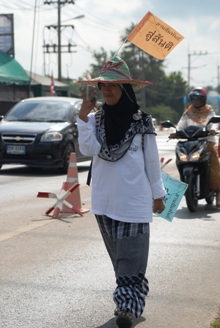Solidarity Walk for Peaceful South – the first step in the search for peace
The Peace March or Solidarity Walk for Peaceful South as it was officially called kicked off on Monday February at the Clock Tower’s Circle in Yala’s Muang district in an informal ceremony chaired by Mr Pongsak Yingchoncharoen, the mayor of the Muang municipality.

Mr Pongsak said that, in the past 11 years since the start of the insurgency war waged by a new breed of militants, almost every resident in the three southernmost provinces and parts of Songkhla have been affected more or less physically or mentally by the seemingly endless violence.
The unrest, he added, has sowed the seed mutual mistrust between people of different religious faiths who used to live together in harmony.
The Solidarity Walk for Peaceful South, he said, symbolizes a good sign demonstrated by all sectors of the society in the restive region. At least, he added, the peace march amounted to a declaration by people in the region that they want peace.
Although the number of people who took part in the marathon walk was small, their spirits were high. The marathon walk would have taken them from Yala through Pattani to the destination in Tak Bai district of Narathiwat in seven days.


Among the marchers who are mostly locals was a cyclist, Mr Thanasut Piput, who came all the way from Sing Buri in the Central Plains with his son to join the march.
Mr Thanasut told Isra news agency that he had followed up the unrest situation in the Far South on regular basis and when he found out about the peace march from the social media he decided to join to share their cause.
He said that many people were scared to visit the Far South after having heard so much about the violence in the media. But for someone who once actually set foot on the region he/she would find out that the truth was different from that portrayed in the media.
"The Muslim people here are very kind. They spend their lives normally like the other people elsewhere," he added.
The peace march was a joint effort of various civic groups in the region as well as the Southern Border Peace Centre of Mahidol University.
During the seven-day march, the marchers will talk with passers-by
and to gauge their views on the situation and their wishes of what they would like to see in the region. The opinions will be compiled, summarized and then submitted to authorities concerned for consideration.
